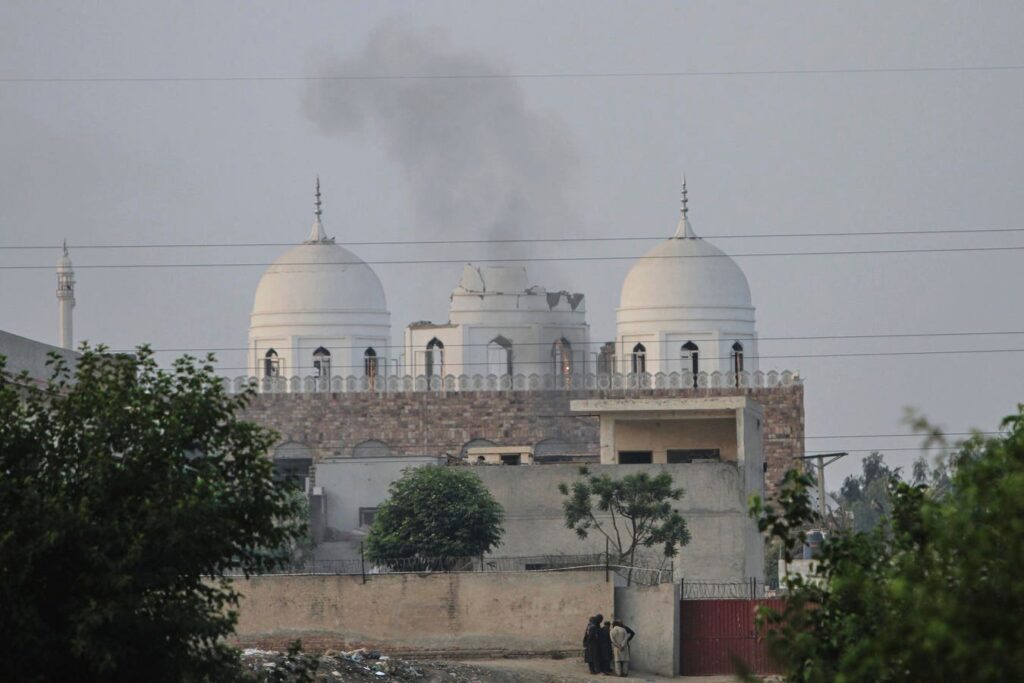Topline
Pakistani officials said at least 31 people were killed and dozens more were injured after India launched missile strikes on what it claims were terrorist camps in Pakistan early Wednesday, two weeks after it accused Pakistan of being involved in a terrorist attack that killed over two dozen people in the tourist town of Pahalgam in Indian-administered Kashmir.
A private security guard walks through rubble of a damaged building after a suspected Indian missile … More
Key Facts
The Indian Ministry of Defense in a statement said its initial strikes targeted “nine terrorist infrastructure sites in Pakistan and Pakistan-occupied Jammu and Kashmir,” and added they were “focused, measured and non-escalatory in nature.”
Pakistan’s military, which has vowed to retalitate, said Wednesday the death toll from India’s offensive reached 31, while the number of those injured increased to 57.
India claimed no Pakistani military facilities were hit by the strikes and said its military operation, which it has dubbed “Operation Sindoor,” underscores India’s “resolve to hold perpetrators accountable while avoiding unnecessary provocation.”
Pakistani officials denounced the strikes, calling them “an unprovoked and blatant act of war” that had “violated Pakistan’s sovereignty.”
In a Wednesday morning press conference, India’s Foreign Secretary Vikram Misri claimed the government’s intelligence assessment indicated further attacks were being planned against India, and with the strikes New Delhi “exercised its right to respond and pre-empt as well as deter such more cross-border attacks.”
The Pakistan military also claimed without sharing evidence that it had shot down five Indian fighter jets—a claim Indian authorities have not commented on, but the Associated Press reported that two planes fell onto villages in India-controlled Kashmir.
Get Forbes Breaking News Text Alerts: We’re launching text message alerts so you’ll always know the biggest stories shaping the day’s headlines. Text “Alerts” to (201) 335-0739 or sign up here.
How Have World Leaders Reacted To The India Strikes?
Shortly after India announced the strikes, President Donald Trump told reporters at the Oval Office that he had just been informed about it and said: “It’s a shame…I guess people knew something was going to happen based on a little bit of the past. They’ve been fighting for a long time…I hope it ends very quickly.” Secretary of State Marco Rubio tweeted that he was monitoring the situation closely and said: “I echo @POTUS’s comments earlier today that this hopefully ends quickly and will continue to engage both Indian and Pakistani leadership towards a peaceful resolution.” China’s foreign ministry said India’s military operation was “regrettable” and added: “We urge both sides to act in the larger interest of peace and stability, remain calm, exercise restraint and refrain from taking actions that may further complicate the situation.” Israel’s ambassador to India, Reuven Azar, tweeted: “Israel supports India’s right for self defense. Terrorists should know there’s no place to hide from their heinous crimes against the innocent.” A spokesperson for United Nations Secretary-General Antonio Guterres said he is very concerned about the Indian military operation and is calling for “maximum military restraint” from both sides. He then added: “The world cannot afford a military confrontation between India and Pakistan.”
What Do We Know About Shelling Along The India-Pakistan Border?
Hours after the missile strikes, both sides accused each other of ceasefire violations along their de facto border in Kashmir, known as the Line of Control. India claimed that Pakistani shelling had killed at least 10 people and injured 32 others in Indian-administered Kashmir, while the Pakistan military alleged that shelling by India had killed five along the border.
News Peg
Tensions between India and Pakistan, nuclear-armed nations, have risen in recent weeks following the attack on Pahalgam in April that killed 26 people, all of one of whom were Indian nationals. The attack on the city, which is located in an Indian-controlled part of Kashmir, was carried out after the neighboring countries had been exchanging gunfire along their border the week prior. India accused Pakistan of involvement in the Pahalgam attack, with Pakistan calling the allegations “baseless and concocted.” India later vowed to retaliate and Tarar said military action from India would be “responded to assuredly and decisively.” The U.S. has aligned itself with India in the growing conflict, with Trump saying India has “our full support and deepest sympathies.”
What To Watch For
In an interview with Bloomberg TV, Pakistan’s Defense Minister Khawaja Asif said “We have been saying all along the last fortnight that we will never initiate anything hostile toward India,” he added. “But if India attacks, we’ll respond. If India backs down, we’ll definitely wrap up.” During a media briefing about the strikes, Indian Air Force Wing Commander Vyomika Singh, said: “India has demonstrated considerable restraint in its response. However, it must be said that the Indian armed forces are fully prepared to respond to Pakistani misadventures if any that will escalate the situation.”
Key Background
India and Pakistan have been at odds for several decades, with the contested border region of Kashmir becoming a flashpoint in several conflicts between the two countries. Three wars have been fought over the area, with the most recent violent outburst between India and Pakistan happening in 2019, when India launched airstrikes against Pakistan after blaming the country for a suicide bombing that killed 40 Indian paramilitary personnel in Kashmir.
Further Reading
Pakistan Claims ‘Credible Evidence’ India Is Planning ‘Military Action’ Soon—As Tensions Rise Between Neighbors (Forbes)
A Timeline of Tensions Between India and Pakistan Over Kashmir (New York Times)
Read the full article here
